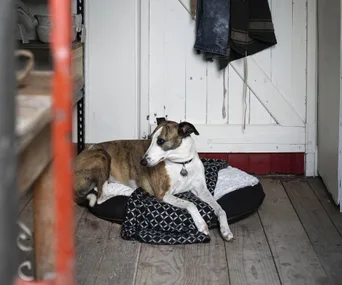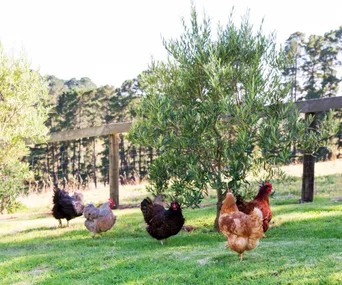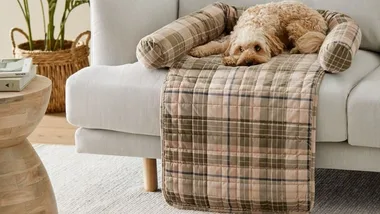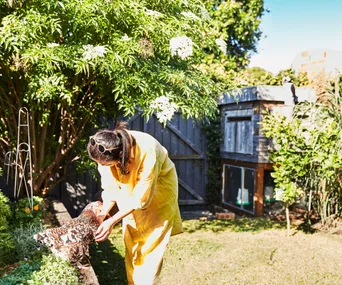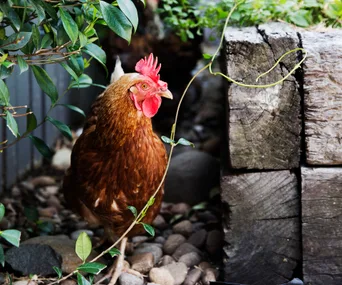Having a few backyard chickens clucking around the garden is all the rage. That’s because chooks are a productive garden’s best friend! Not only do they produce fresh eggs, but they eat pests, gobble up your food scraps and their litter is a wonderful fertiliser when composted.
Those who have owned chooks will attest to their quiet foraging and ability to produce a bounty of eggs. They also make great companions with many flocks rushing to greet their owner for a morning feed.
For these reasons, many find raising backyard hens a rewarding experience. There are however, a few things to take into consideration before taking the leap and setting up a chook pen at your place.
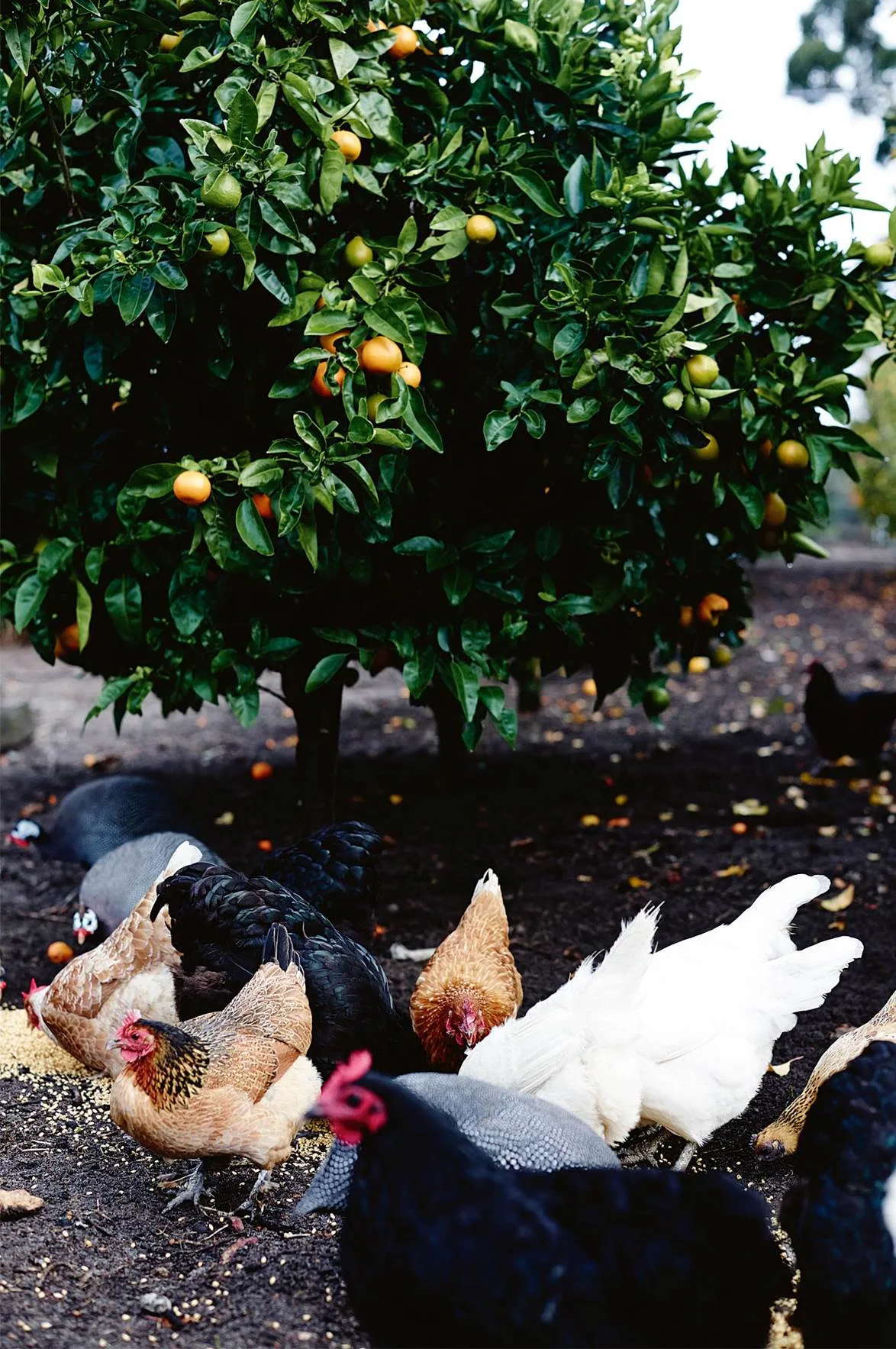
Chickens play a vital role at this organic family-run farm in Margaret River. (Photography: Mark Roper)
Can chickens be kept in a backyard?
First things first. Check whether your council’s by-laws allow chickens to be raised in a residential backyard.
Most local councils will allow a small flock of hens (usually up to six) but not a rooster. Hens will lay eggs without a rooster. If you want to keep a rooster, then you’ll most likely need to obtain a permit. There are also local restrictions on the location of the chook house (distance from neighbours being the main one).
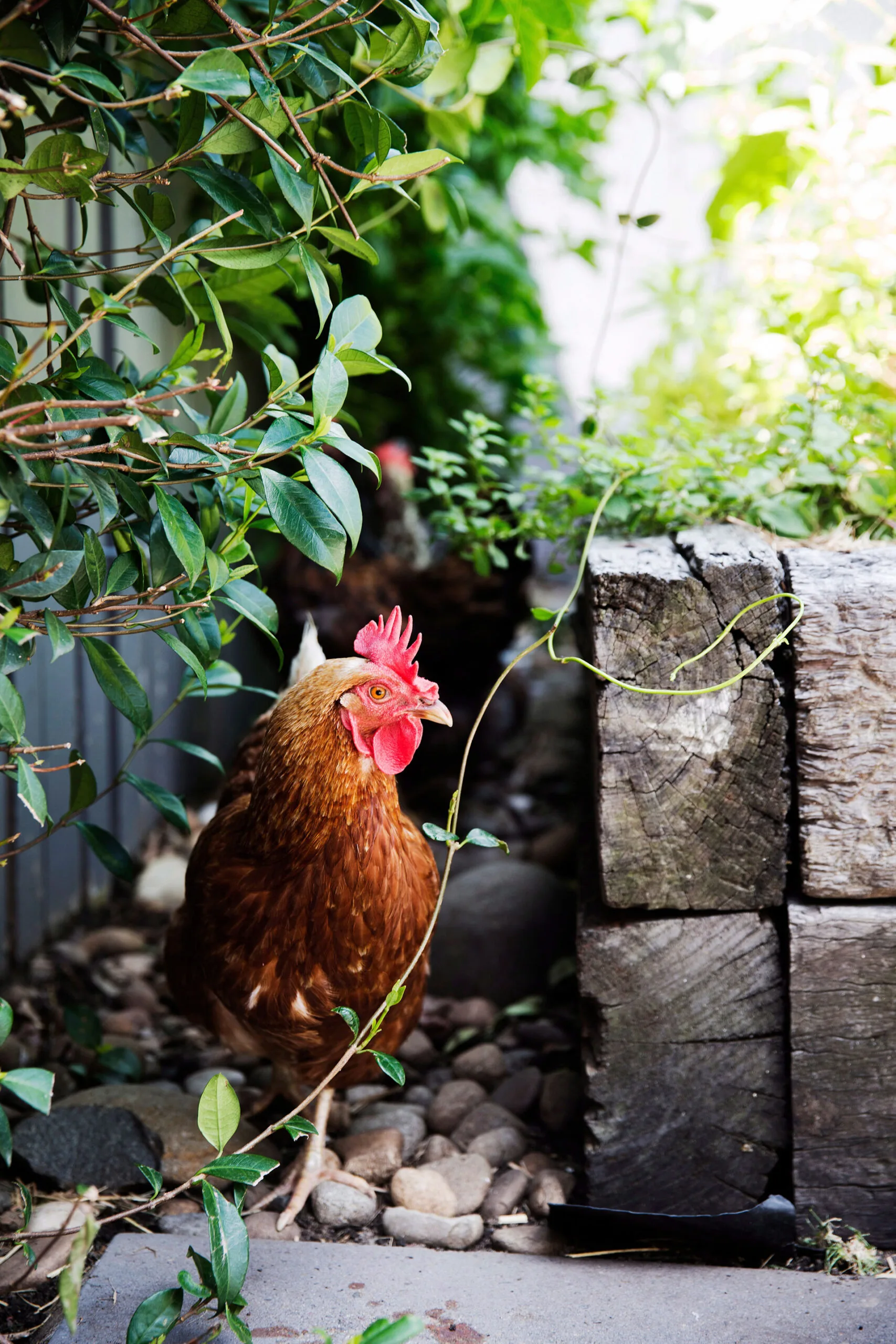
Hens like ISA Browns and Australorps are well-known for their egg-laying prow. (Photography: Chris Warnes)
How to protect chickens from predators
You may not see them, but foxes are around. Especially in rural, outer-city locations, it’s important to keep chickens safe from predators such as foxes, and other roaming neighbourhood dogs.
Protect chickens from predators by constructing a sturdy chicken coop that is both dog- and fox-proof. To make the pen fox-proof, extend the wire mesh enclosing the cage to form a 40cm long ‘skirt’ around the outside of the pen. This will prevent foxes from burrowing underneath the wire and into the pen.
Fox facts
- An adult fox can squeeze through a hole as small as 10cm in diameter
- Foxes and dogs have been known to chew through chicken wire, so choose wire that is at least 1mm thick
- Foxes and dogs can open basic chicken pen latches, so putting two latches, or using a bolt to secure them will offer extra protection
How to set up a chook coop
A concrete floor under their roost is a must so you can keep the area clean. The run, which is the area where the chickens forage and busy themselves during the day can have an earth floor but should be strewn with organic litter such as straw, untreated wood shavings or other material.
In addition to protection from predators, it’s important to protect your flock from the elements as well. Ensure the pen has adequate shade and shelter from both hot and cold winds. During heatwaves, ensure the pen is well-shaded and that the water supply is topped up regularly.
You might also like to invest in a nesting box, which provide chickens a safe, secure and weatherproof spot to lay their eggs. Nesty Boxes have a range of designs to suit different flock sizes and needs.
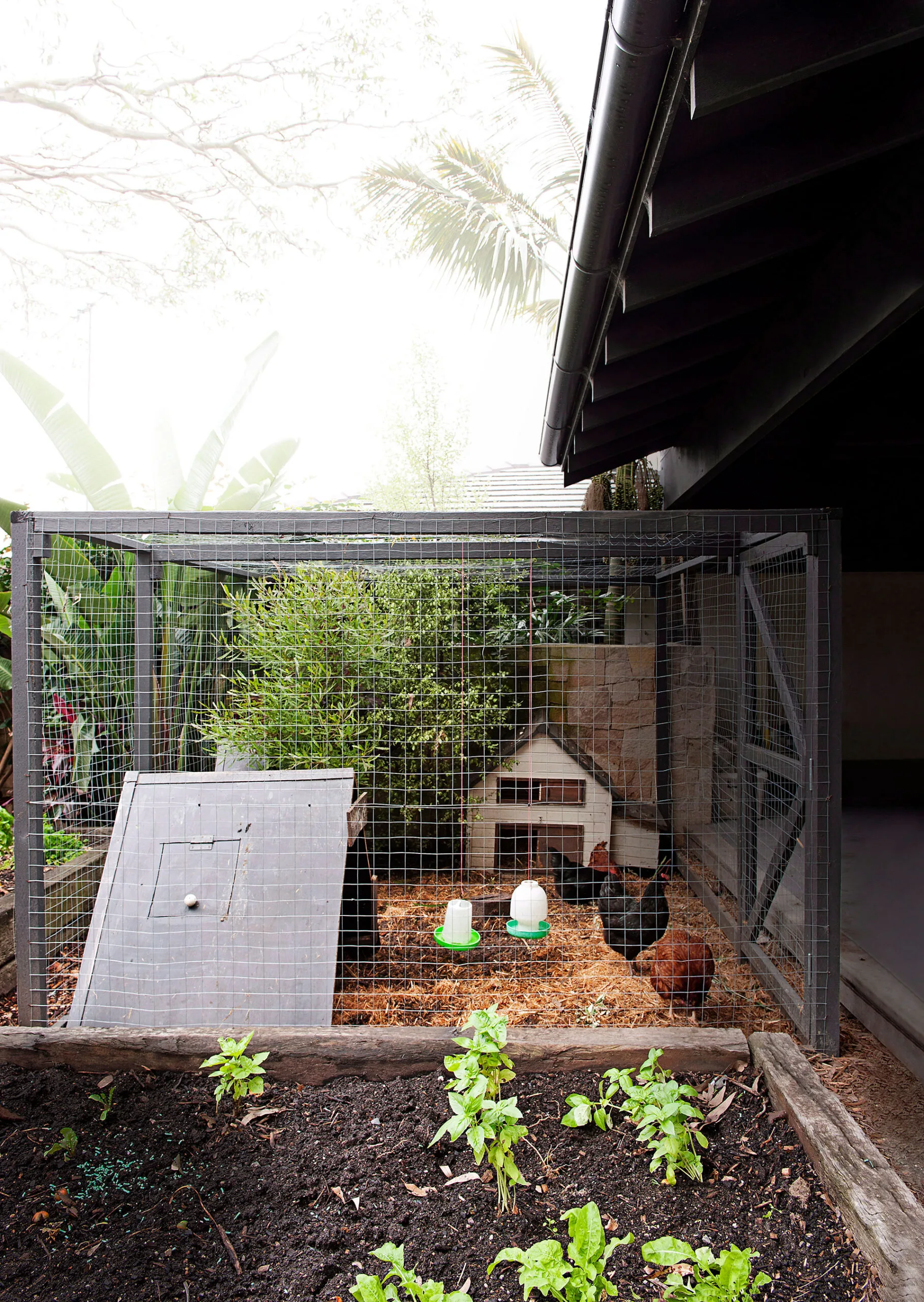
The main function of the chicken coop is to protect the hens from predators including foxes and neighbourhood dogs. (Photography: Tony Amos / aremediasyndication.com.au)
The best chicken breeds for Australian backyards
There are many different types of chickens. Large varieties do a lot of damage if allowed to forage unchecked in your garden, as they scratch vigorously.
Choosing the right breed of chicken for your family will require some consideration, including whether you intend to collect the eggs or whether you’d like them to be child-friendly.
Smaller varieties, including bantams and Silkies, create less damage but also lay smaller eggs. The most common backyard hen varieties are Australorp (black feathers, usually brown eggs), ISA Brown (brown feathers, brown eggs), Leghorns (white feathers, white eggs) and Light Sussex (white and black feathers, white eggs). All are good layers and make great pets.
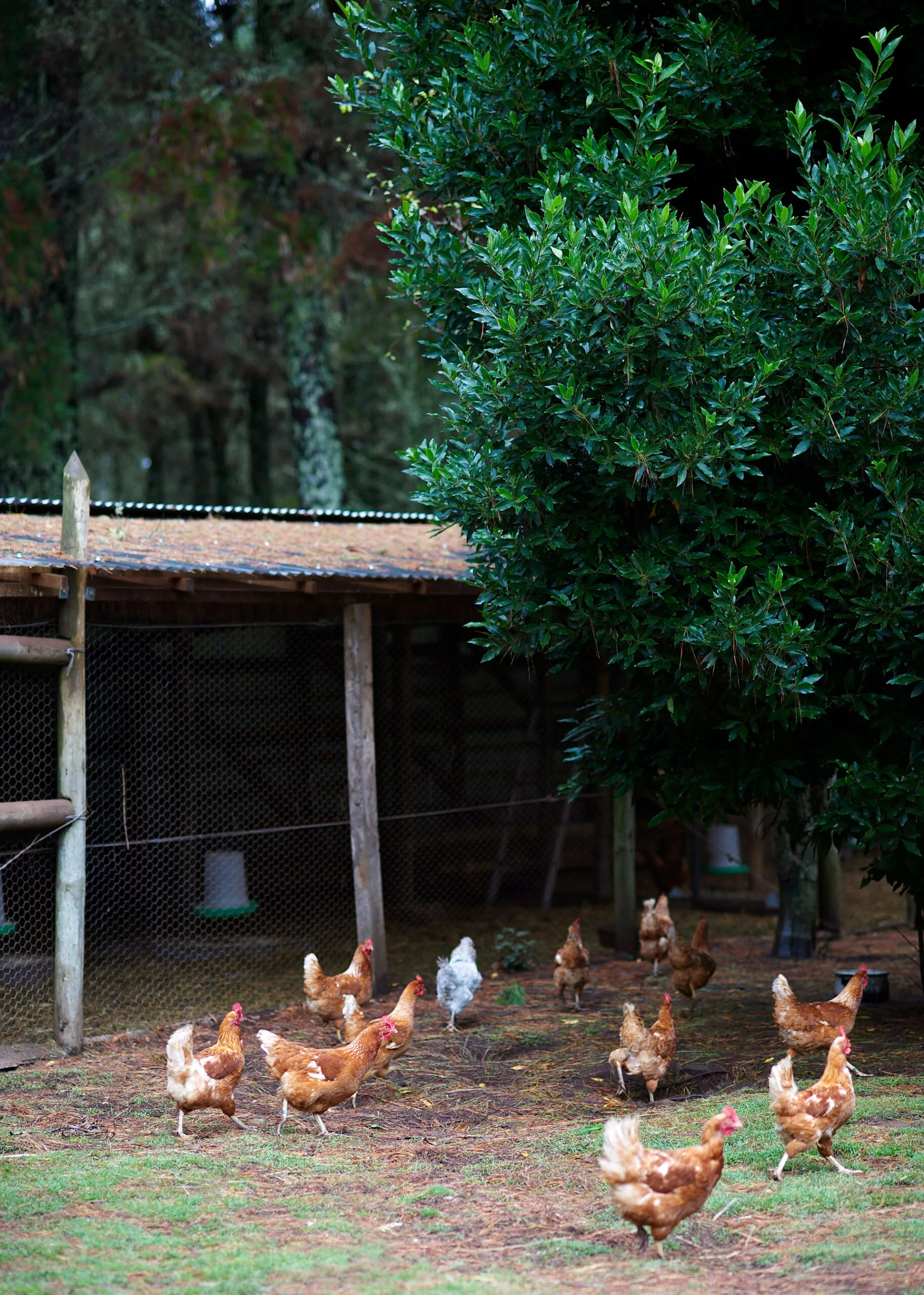
A flock of free-ranging ISA Brown hens on a rural property. (Photography: Nick Watt / aremediasyndication.com.au)
How to care for backyard chickens
Clean out the chicken coop regularly. Put any mulch and chicken litter onto the compost heap and use as fertiliser in the garden later down the track.
Chickens will also need access to plenty of fresh, clean water and high-protein pellets (your vegetable scraps are not enough by themselves). They also require shell grit to aid their digestion and shell formation.
Getting started
Now that you’ve got a safe and secure chicken coop, it’s time for the hens!
Find pullets (young hens, usually less than a year old) for sale through poultry breed clubs and rural stores. There are also businesses, such as City Chicks that offer a small mobile pen and a couple of hens on a trial basis. This is a good way to see if you can cope with the daily demands of keeping chickens, know whether your kids will care for them or your dog will cope.
Beware of buying small chicks or adopting the ones reared at school or kindy unless they have been sexed, as you may end up with roosters!
Are backyard chickens worth it?
Whether it’s teaching kids how to take responsibility for animals, fresh eggs, sustainable food scrap consumption or simply companionship, backyard chickens are well worth it.
Just remember, however, like any pet or animal, they require daily care, attention and maintenance – so make sure you understand the commitment.




